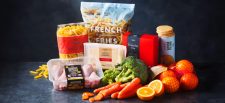A canned food renaissance is “firmly on the horizon” as UK consumers seek to tackle the growing pressures of the cost-of-living. According to recent Kantar data and other consumer research.
Growth in canned goods has been outpacing the rest of the grocery market since February this year say Kantar, with more buyers making canned food purchases in May to August 2022 compared to the same period in 2020, during the height of lockdown.
UK sales volumes of goods including canned soup (up by 19.7%) and tomatoes (up by 8%) are at their highest comparative levels since 2018, while a recent survey conducted by international food and drink group, Princes, in partnership with innovation consultancy, KICR, revealed that almost a third (31%) of British consumers intend to buy more canned products over the next year.
As food inflation continues at high levels, the Princess / KICR survey highlighted that those consumers likely to buy more canned goods will do so due to lower costs and longer shelf lives, citing the ability to keep products in the cupboard (64%), value for money (53%) and minimising food waste (46%) as key purchase drivers.
UK supermarket chain, Waitrose, recently called on shoppers to plan at least one meal a week using canned food to reduce food waste and support household budgets, as it announced plans to remove ‘best before’ dates on fresh produce. Asda and Sainsburys have since followed suit.
Saving money
To save money, respondents to the Princess / KICR survey said they are most likely to buy more dry pasta (46%), rice (41%), canned beans (40%) and canned tomatoes (35%). Over a third (34%) expect to add more vegetables or pulses to meals to make them go further and 33% plan to do more batch cooking, while 41% also highlighted that canned goods are great for making meals from scratch.
Amid rising energy prices, and according to the survey, British consumers are also looking to reduce costs by ‘heating and eating,’ with 43% highlighting that they believe canned or similarly packaged grocery products cost the least to cook.
Ruth Simpson, group strategy & planning director at Princes, commented: “While canned and other ambient food is a cupboard staple across the country, it is still something of a best kept secret to many people. The affordability of canned food doesn’t mean inferior ingredients – quite the opposite.
“The canning process seals quality ingredients, quickly transported from the source, in optimum conditions to maintain freshness and taste. This achieves a long shelf life without the use of any preservatives, giving canned products great food waste credentials and of course no energy is needed to store them. Canned also lends itself to batch cooking, which can help families to create delicious meals that go further, while keeping costs down.”









